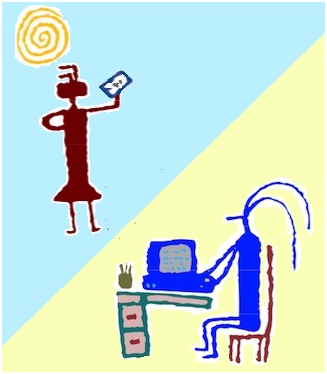
As of October 2020, a milestone has been reached regarding virtual volunteering: I’ve found more than 100 research articles, dating back to 1997 and most with a university association, related to virtual volunteering. These are all listed here at the Virtual Volunteering Wiki.
I started tracking published research regarding virtual volunteering – using the internet to engage and support volunteers – when I directed the Virtual Volunteering Project at the University of Texas at Austin. I began heading the project in December 1996 and within several months of looking, I not only had found about 100 programs, most at nonprofits, a few at schools, that were involving online volunteers, I also realized that the practice was at least a couple of decades old, first starting at the Project Gutenberg, a volunteer effort that began in 1971 to digitize, archive and distribute the full texts of public domain books, such as works by Jane Austen, Charles Dickens, Sir Arthur Conan Doyle and Mark Twain. But what I had trouble finding was academic research on the subject. I had found a fair amount by the time The Last Virtual Volunteering Guidebook was published, but even so, it seemed still to be rather on the lean side for a practice that was so well-established.
I had no funding to research and write The Last Virtual Volunteering Guidebook, and I’ve had no funding to continue maintaining the Virtual Volunteering Wiki, which tracks news and research regarding using the Internet to engage and support volunteers. But, indeed, I’ve maintained the wiki all these years, focusing on things that I deemed newsworthy and, especially, academic research. When I realized that there are now more than 100 research articles, dating back to 1997 and most with a university association, related to virtual volunteering, I felt it was worth celebrating. And this is just the English-language material: I bet there is a fair amount in Spanish, given Spain’s leadership in virtual volunteering for a couple of decades now.
Note that sometimes research articles do not call the unpaid contributors or unpaid virtual team members “volunteers.” For instance, any research paper on Wikipedia contributors could be considered research on virtual volunteering, as Wikipedia contributors – Wikipedians – are unpaid by Wikimedia for those contributions.
Also note that many of the papers make the mistake of talking about virtual volunteering as new, ignoring or overlooking its more than three-decade history. When I read that this is a “new” practice in an academic paper recently published, especially a thesis or dissertation, it makes it very hard for me to take the rest of the research seriously. I wish more university professors would catch that inaccurate point of view early on in a PhD student’s exploration of the subject.
It’s so wonderful to see that virtual volunteering now has a rich research history to go along with its rich history of practice, and I love reading perspectives about virtual volunteering by people who ARE NOT ME. Look, it’s been fun to be the world’s expert regarding virtual volunteering, but I’m so hungry to read perspectives by other people, particularly regarding what works best in supporting online volunteers, particularly different demographics of such volunteers – is it different to involve teen online volunteers in India versus tech-savy senior volunteers in Germany? Is there something that works well supporting online volunteers in South Africa that is different than what’s done in Spain? Is engaging and supporting rural online volunteers different from engaging and supporting urban or suburban online volunteers, even in the same country? I’d love to see such comparative studies!
What’s not needed? Research on the motivations of people who volunteer online. Good grief, people, ENOUGH!
I would also love beyond words if a university would step forward and be willing to take over management of the Virtual Volunteering Wiki. Having university students and faculty maintaining this would make it a much more rich and valuable resource. Any takers?
Let me be frank: I’m going to eventually retire. I’ll always be interested in virtual volunteering, and I’ll be an online volunteer myself for, I hope, decades to come (in between my extensive motorcycle riding). But just as there is no one Queen or King of All Things Volunteer Management, there shouldn’t be just one person, or always the same person, keeping track of news and research regarding virtual volunteering and distilling the key points of such. It’s overdue for new leaders, and a diversity of new leaders, to emerge in this field. I stand ready to support those new leaders (or, at least, figuratively – I can’t stand as long as I used to).

If you have benefited from this blog or other parts of my web site and would like to support the time that went into researching information, developing material, preparing articles, updating pages, etc. (I receive no funding for this work), here is how you can help.

